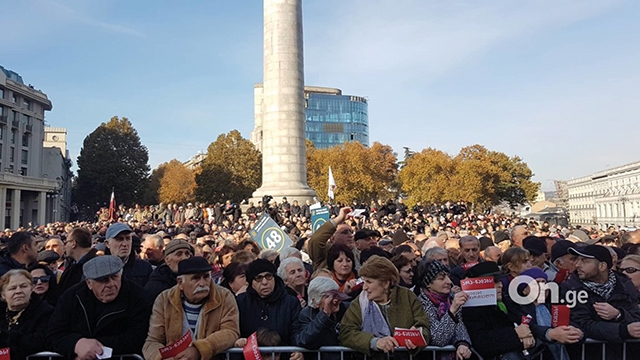What Will Bring Generational Change to Georgia?
Op-ed
Those who study modern Georgia often focus on large issues such as the country's relations with Russia, aspirations to join NATO and the EU, or simply internal political processes.
What remains largely undiscussed and possibly with far reaching effects on the future of Georgia, is the generational change.
Georgia is amidst a generational change. True, the occasional protests which have taken place across Georgia throughout 2019 often featured youngsters of various political affiliation, still the critical mass of large-scale demonstrations would be filled by much older generations (born in the 1970s and 1980s). However, this is bound to change in the coming few years. Those born after the collapse of the Soviet Union will approximately, by 2024, dominate the street protests, whether small or large.
They will be increasingly opposition-minded, protesting even a small scale mistake by any government ruling Georgia. This is not to say that they will be linked to any concrete party; their actions will be more characterized by traditional activism so common in the West.
Any future Georgian government will experience difficulties staving off the demonstrations, which in turn will lead to much higher responsibilities from political forces. This will also be a generation which will not remember the 1990s or United National Movement's rule (2003-2012), but will be mainly forged in 2012-2020/22.
On a much higher level, the 2020s will be also characterized by gradual changes in Georgia's ruling class (even if we presume it to be a very divided one). Those born in the 1980s and 1990s will constitute the absolute majority of low- and mid-level positions in government and non-governmental organizations. This will have a major impact on how the country will be run. It is likely that more attention will be paid to establishing a more effective administration, improving the level of education, economy, and the military. The new Georgian elite, predominantly born in a post-Soviet country, will also be more amenable to public demands.
Those generational changes will also affect major Georgian parties. Members aged just under 30 will eventually strive to gain bigger roles inside the parties. However, since the party leaderships will be unwilling to cede their primary roles, there is a big likelihood we will see the creation of a number of new splinter parties. Thus, one of the major certainties for the 2020s is a sharp increase in pro-Western parties.
Current opposition forces are also likely to lose whatever popularity they enjoy, as younger generations will adhere to newer, predominantly pro-Western, political entities.
Major influence will be put on the Georgian political elite, which I discussed in earlier pieces. Though currently there is an extremely divided political elite in the country, in the 2020s there will be a gradual increase in coordination between different new political groups on basic foreign and internal state interests. This will be a major rupture with the developments Georgia has experienced since the 1990s.
The generational change will also have a gradual but nevertheless big geopolitical influence. One of the features will be a steep decline in the knowledge of the Russian language and general attraction the Russian culture has had for older generations in Georgia. This will mean that pro-Russian forces will lose even the slightest attraction they currently enjoy in Georgia.
These generational changes are directly tied to the regional geopolitics. Though Moscow influences Tbilisi through its military presence in Georgia's Abkhazia and Tskhinvali regions, on the ground the balance is shifting significantly and not in Russia's favor. Eventually, it all will come down to what culture people are more attracted to. It is based on this that grand strategic shifts or allegiances to alliances are made.
By Emil Avdaliani












